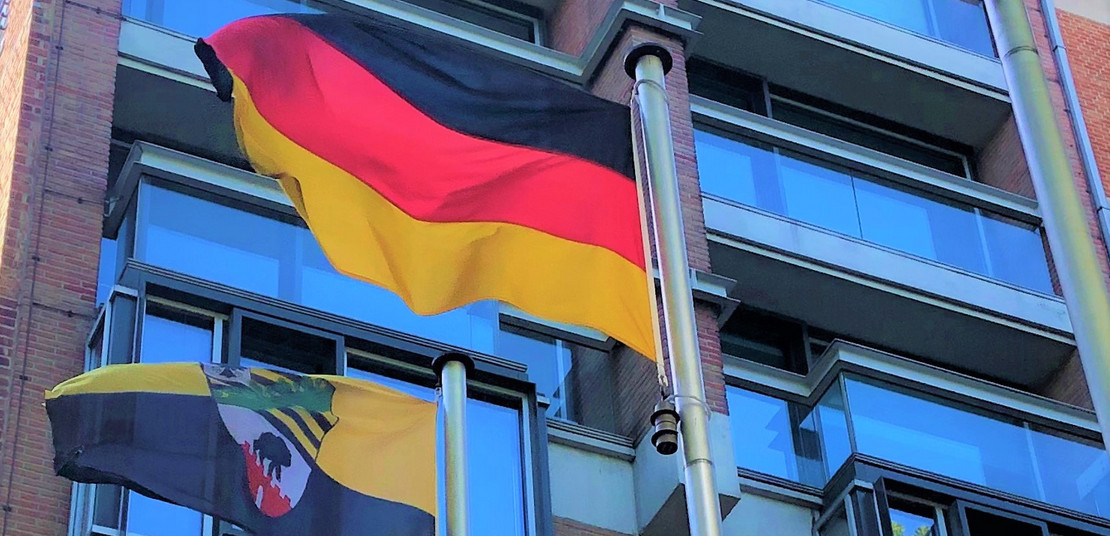European Social Fund (ESF)
The ESF promotes the employability and mobility of the workforce. Important funding priorities include training and further education as well as the promotion of life-long learning. Furthermore, the focus also lies on increasing social inclusion, combatting poverty and promoting non-discrimination projects.
Funding priorities for 2014-2020
- Employment and mobility of the workforce
- Social inclusion, combatting poverty, and non-discrimination
- Education, vocational and professional training, and life-long learning
For the 2014-2020 funding period, Saxony-Anhalt has approximately 612 million euros of ESF funding at its disposal.
In the following we present you two reference projects.
Universities open their doors
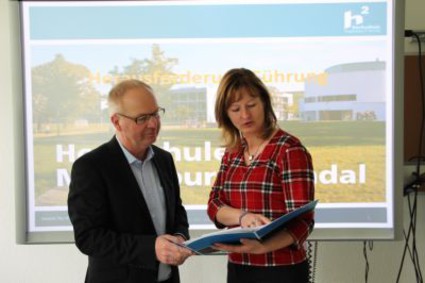
Practical further training for specialist and managerial staff
- by Bianca Kahl -
Dr Michael Hoffmann has no intention to sit in the 'ivory tower of leadership theories'. He doesn't need to either. As professor for company management and leadership at the Magdeburg-Stendal University of Applied Sciences, he is particularly interested in the latest findings from his specialist areas. Yet he doesn't just impart this valuable knowledge to students – the managers of tomorrow.
Today the professor is sitting in front of a dozen men and women, who have already been graduates for quite some time. They come from a variety of industries – from social organisations, and from the construction or real estate sector – and they are each responsible for multiple employees. They are not the managers of tomorrow, but the managers of today. Each of them is able to draw their own lessons from Hoffmann's words. "The requirements placed on managerial staff have increased substantially," he explains. "And this is true for all sectors." Management isn't just about handling your own work duties, you also have to manage change, lead people and, of course, be methodically and technically competent.
Together with his audience, Michael Hoffmann seeks to spend a day 'visualising and discussing'. His seminar 'The role of managers' forms part of a training programme for professional and managerial personnel. It is specially aimed at the needs and available time of people in full-time employment. The classes are a shared programme from the Magdeburg-Stendal University of Applied Sciences and the Otto-von-Guericke University Magdeburg and they are geared towards small and medium-sized enterprises and organisations in the state. The course cannot simply be considered a time-intensive knowledge transfer, it also offers a practical approach, i.e. expansion of competencies.
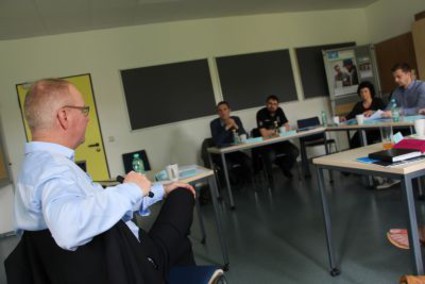
At the beginning of the seminar, Hoffmann asked his audience for their particular wishes and interests. On the basis of this, he then prepares the latest findings of management studies with applications in mind. He later considers case studies with the men and women and discusses their own problems from practical experience. Which generation do these managers work with? What type of employees do they manage? Who is best addressed in which management style? How can they motivate employees and encourage their loyalty to the company? These are all examples of questions covered in the seminar.
The demographic change, the shortage of specialist personnel as well as the trend of automation and technological advancement are well and truly revolutionising the corporate world. The demand for further training is growing hugely. This has also been noted by politicians. The Centre for Scientific Further Education, the joint umbrella organisation for Magdeburg universities, is being developed through public investment. Around 500,000 euros have come so far from the European Social Fund (ESF) alone. Another 570,000 euros were provided to a sister project 'The networking of extra-occupational studies for SMEs' of the Universities of Applied Sciences of Merseburg, Harz and Anhalt.
In both cases, networks have been built up between the universities over the course of the last year and a half. The goal is to create an environment for providing long-term, high-quality training programmes to professional staff in the state. Contact partners on location form the interface to the individual specialist fields, assist companies with questions they have, analyse demand as well as plan and advertise the programmes. Everything is possible – from seminar certificates and university certificates through to bachelor and master degrees.
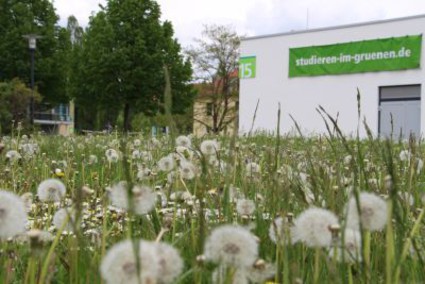
"In Saxony-Anhalt we have an excellent university system," says Michael Hoffmann. And not only students are able to benefit from this. Universities are beginning to open themselves up more and more to the outside world, they are highly interested in practical knowledge transfer as well as feedback from the economy. Which theories are proving themselves to be true? Which problems are opening up? Where is it worthwhile to investigate new solutions? Both sides can benefit.
"Managerial staff often do precisely the right thing, they just lack the explanatory model," the professor observes. Similarly, companies are highly aware of the huge need for action and the fact that they have to intensively concern themselves with personnel development or strategic corporate planning. Yet, these companies are often too small and are simply unable to afford it in addition to day-to-day business. "I see it as my contribution to economic development," says Michael Hoffmann, reflecting on his engagement alongside his main duties at the university.
www.hs-magdeburg.de/weiterbildung
www.ovgu.de/zww
www.hs-merseburg.de/home/weiterbildung
From Autumn to Spring
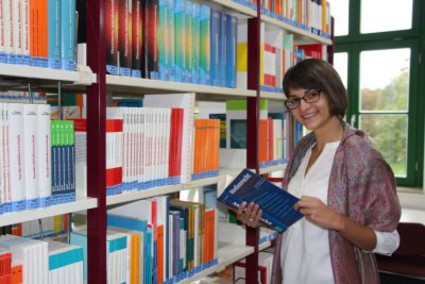
Thanks to an integration project, an international student intends to stay in Magdeburg
- by Bianca Kahl -
Siyana Dimitrova first came to Magdeburg at the beginning of autumn. "It wasn't such a nice time," she remembers. Everyone had warned her about it. Go to Munich, Cologne or Berlin instead, they had said to her, just don't go to East Germany! Yet she deliberately chose Magdeburg for the courses on offer. Today she says: "I have everything here I need." She feels quite happy, has plenty of friends, good professional qualifications – and would like to stay here. She has the 'Welcome to stay' project to thank for that.
Siyana Dimitrova comes from the small town of Berkovitsa in Bulgaria. In 2012, she did her Abitur at a school for foreign languages. Her whole class was prepared for studying in Germany. "That's really popular back home," the 22-year-old says. The school-leavers had six to seven intensive German lessons per week. By the time Siyana Dimitrova obtained her language diploma, a member of staff at the German embassy began to notice her excellent achievements. He issued her with a scholarship from the German Academic Exchange Service (DAAD). With the help of this scholarship, she has been studying at the Magdeburg-Stendal University of Applied Sciences since 2012.
"I once lived in Munich and worked at McDonald's", she explains. "It meant nothing to me." The city was too big: there were too many people. While in Magdeburg, she can easily go everywhere by bicycle. She particularly liked the diverse, practical range of courses in journalism.
Nonetheless, it wasn"t easy at first. She knew no-one, she was unsure and had to familiarise herself with the new way of life in Germany. Today, she laughs to herself when she thinks back to the small and large hurdles she has overcome. From opening times and diaries that were noticeably different to her life back in Bulgaria. "I thought to myself: are you all really so dumb that you can't remember these things? But now I also have a diary myself. Here you often have to arrange everything well in advance. Back home, you simply go somewhere when you need something."
She was particularly worried about the mandatory internships that she had to complete during her studies. Fortunately, a friend told her about the 'Welcome to stay' project. The project based itself at the "INT-Gesellschaft zur beruflichen und sozialen Integration mbH" (INT Association for Professional and Social Integration) from October 2012 until the end of June 2015 and focused entirely on supporting foreign students and graduates in getting a foothold in the local labour market. "This is such a great project," says Siyana Dimitrova. "My friends in other cities don’t have access to anything like this."
However, she was able to benefit from tips for job applications and was put in touch with an event agency in just a few hours. After a successful interview, the young woman assumed responsibility for the public relations work of events at 'Kreiser Events'. She still talks highly of the owner Leona Kreiser, to whom she was able to speak openly about everything. When she was unsure, she simply asked: "Hey, is it really useful to you if I work on the newsletter or is that simply twice the effort for you?" And then she was told: "Of course, you’re great!" giving her the support to become more confident.
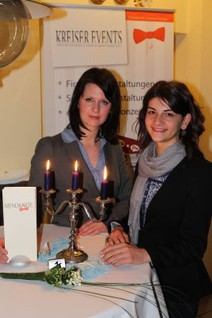
Her contacts at the INT were Lisa Hartmann and Nataliya Detka. They would go through the students' applications and explain where they could improve. "Different formalities are followed in other countries. For instance, many aren't aware that applications should include a professional photograph," explains Lisa Hartmann. As part of the project, a number of seminars were also offered in application coaching, self-promotion strategies, labour law and general issues concerning the jobs market in Saxony-Anhalt. There were also regular excursions to large regional firms.
This facilitated plenty of contact between the economy and the highly sought-after qualified workers. Lisa Hartmann knows of several cases where an internship has turned into fixed employment. She wistfully looks back at the 21 months of the 'Welcome to stay' project. The DAAD was able to help 300 students and graduates. The whole project was funded in part by the European Social Fund (ESF), which provided 243,000 euros.
"It's so important that there are these kinds of initiatives and networks. Unfortunately, there’s no continuation in sight," regrets Lisa Hartmann. In view of the demographic change and the associated shortage of skilled workers, well educated foreign workers are so urgently needed right now. Arguably, we cannot risk those that are already here to miss out on opportunities or simply feel uncomfortable. They should feel welcome to stay.
Siyana Dimitrova concurs. Since she has experienced for herself the difficulties international students endure at the start, she is committed to help others at university as a 'buddy', a kind of mentor, and has also managed to attain a position as a research assistant. She is working on her bachelor's thesis, which is expected to be submitted in spring, and aspires to be able to take her master's degree in Magdeburg afterwards. She was recently awarded for her social engagement and excellent academic performance.
After her internship at the Kreiser Events agency, she no longer needed any assistance with applications. She felt well prepared and was confident enough to tackle everything on her own. She has been moving around a lot in the past weeks: several weeks travelling in Russia, summer school in Latvia and then two weeks back home in Bulgaria. The time finally came to return to Magdeburg, her second home. "I now have friends in both countries, Bulgaria and Germany, who I can call to say I’m back. I like that."










